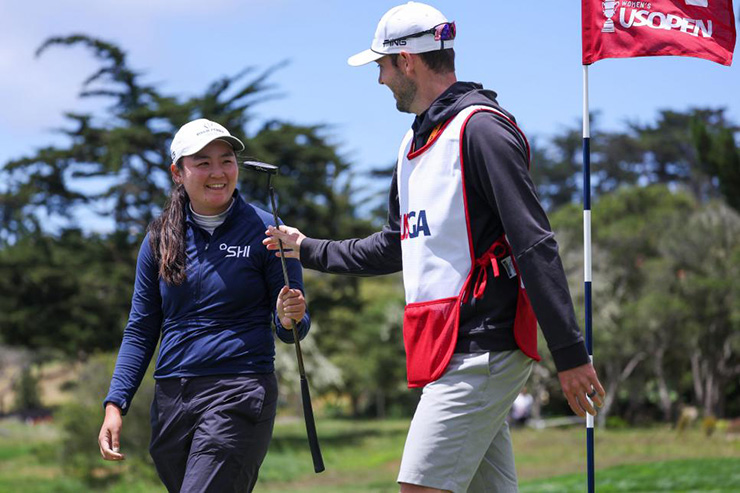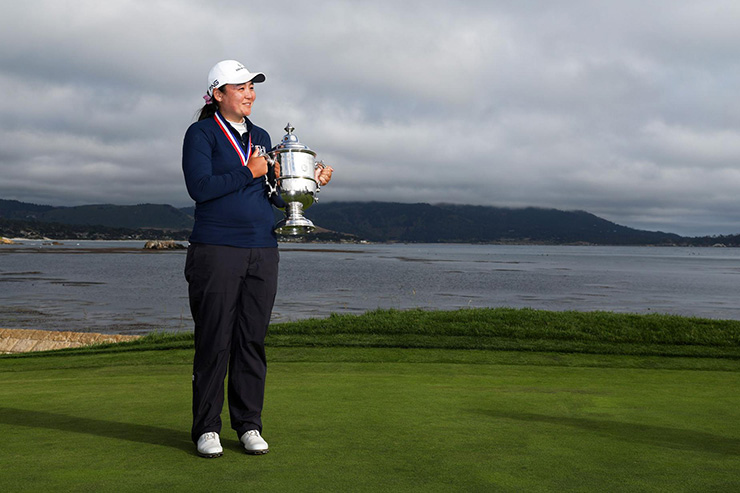Harry How
Allisen Corpuz set the expectations for how she would approach the final round of the 78th US Women’s Open on Saturday night. With the sun setting over Pebble Beach Golf Links following her third consecutive under-par round, the 25-year-old Hawaii native explained that while one stroke off the lead with a chance to win her first LPGA event, her goal was still the same as it was at every tournament to date in 2023, her second year on the LPGA: become more comfortable with how it feels to be in contention. Nearly three months earlier, Corpuz went through a similar learning experience at the Chevron Championship, when she shared the lead through 54 holes only to finish T-4 with a closing 74. She didn’t win, but she did mature, preparing herself for the next time.
Come Sunday, however, Corpuz surpassed what even she believed she could accomplish with a dominant closing three-under-par 69, overcoming a one-stroke deficit to win by three shots with a nine-under 279 total. “My mind is racing,” Corpuz said. “Like I said yesterday, this is really a dream come true. It was something I had dreamed of, but at the same time kind of just never really expected it to happen.”
Corpuz’s journey from “sucking” at golf, as she described when she started playing at age 4, to becoming the first female to win a major championship at Pebble (and claiming the $2 million first-place prize money payout) has been built on a foundation of self-reflection. Since picking up the sport, Corpuz says her motivation has come from focusing the simple notion of improving every time she plays.
Not wanting to be terrible drove her to continue playing alongside her father, Marcos. Corpuz developed her game during a junior career that included 17 USGA championship appearances and a record performance as the youngest golfer (age 10) to play the US Women’s Amateur Public Links in 2008, breaking the mark held by fellow Hawaiian Michelle Wie West.
Fitting, then, Corpuz applied the lessons of losing at the Chevron in April for her breakthrough victory Sunday. After giving her mom, May, a hug on the first tee box, Corpuz implemented her newly honed approach.
“I think I’ve just played a little conservatively in the past, and just really went out there and told myself I had the game to do it today,” Corpuz said.
Corpuz made six birdies as she played her way around Pebble Beach. Her third birdie came on the par-3 seventh, where her caddie Jay Monahan said that Corpuz suggested taking a wedge straight at the flag on the short downhill hole. If the wind took it left, so be it. Their process, honed over two seasons of working together, involved Monahan pushing back if he felt differently. Happy with the aggressive choice, Monahan signed off. Corpuz’s wedge flew true, leaving herself a 10-footer.
“This course does offer those [birdie] opportunities if you can get them,” Monahan said. “It’s just little things like that. But she took the strides that she needed to [in order to win].”

The rapport between Allisen Corpuz and her caddie Jay Monahan help her stay calm during Sunday’s final round. Harry How
Corpuz wound up being the only player in the field to shoot under par all four days at Pebble with scores of 69-70-71-69. Tied with Hataoka with nine holes to play, Corpuz played a sublime back-nine, taking a four-shot lead at one point and leaving little room for doubt as to who would be the winner.
That doesn’t mean there weren’t moments of nervousness. Corpuz explained that at times, she did get ahead of herself, imagining the Harton S. Semple Trophy in her hands early in her round.
“I made the birdie at 1, 3, and just kind of told myself, stay in the moment,” Corpuz said. “It’s obviously not done yet. Still a lot of golf to play. I think that was the moment when I kind of knew I just need to get home.”
To ground herself back into the present moment, Corpuz leaned on work she has been doing with her mental coach, Bill Nelson. That involves trying to keep things slow while on the course. Corpuz reminded herself every few holes she was at Pebble Beach, soaking in the sun-splashed views that golf fans dream about.
While Corpuz faced the prospect of slowing down too much—she and Hataoka were put on the clock early on the back nine and Corpuz was one more slow time away from getting a penalty shot—she stuck to the routine she had followed since childhood. Before each shot, Corpuz leans slightly to the left, closes her left eye, raises her club, and stares down her target. In a brief moment, Corpuz plans out what she wants the shot to do, steps up to the ball, and executes.
Learning how to win was a process for Corpuz in college as well. Justin Silverstein, the women’s coach at USC who secured Corpuz’s commitment to play for the Trojans when she was heading into ninth grade, explained that she diligently journaled each day. Corpuz jotted down what went well and what didn’t. However, early in her collegiate career, Corpuz would almost adjust too quickly, trying to make constant adjustments rather than give herself the space to simply recover from a bad shot. While Corpuz won for the first time as a sophomore, it took until her fifth year on the team to become more consistent player. Corpuz won twice in 2021, her final season before turning professional.

With a successful drive off Pebble’s 18th tee, Corpuz claimed her first career LPGA Tour title without much 72nd-hole stress. Harry How
“[Her thoughtfulness] helps a majority of the time,” Silverstein said. “But I think also, at times in her past held her back a little bit with just a little too much analysis.”
With her first professional win in hand, a major no less, Corpuz kept her aspirations low for the future. Instead of imagining becoming a top 10 golfer in the world, a Solheim Cup player and being included in the conversation with the likes of Jin Young Ko and Nelly Korda, Corpuz envisioned a simple wish as she was standing alongside the glistening Pacific.
“I love it,” Corpuz said of Pebble Beach. “I hope I get a chance to come back.”








